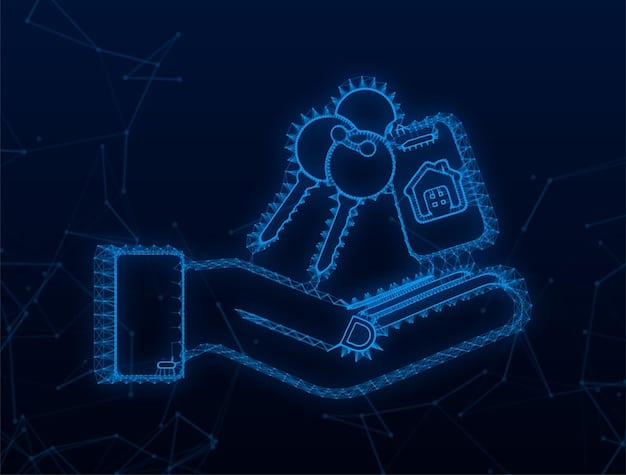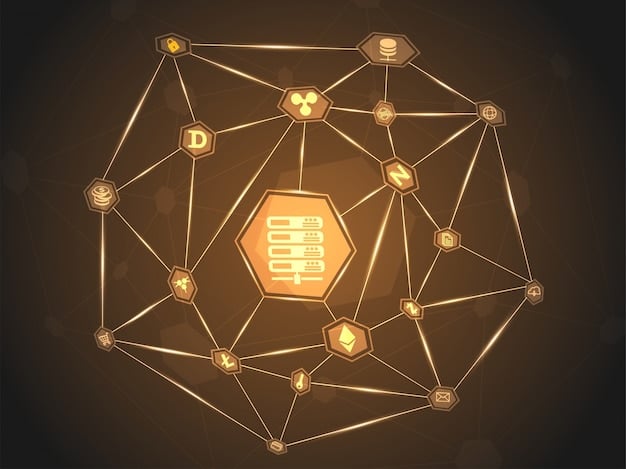Blockchain Technology: Supply Chain Management’s Next Frontier

Blockchain technology extends beyond cryptocurrencies, offering transformative applications in supply chain management by enhancing transparency, traceability, and efficiency through immutable ledgers and smart contracts.
In a world increasingly reliant on global trade, the complexity of supply chains has reached unprecedented levels. Navigating this intricate web of sourcing, manufacturing, logistics, and delivery often presents significant hurdles. However, an innovative solution is emerging, promising to revolutionize how goods move across the globe: Blockchain Technology: Beyond Cryptocurrency, What are the Potential Applications in Supply Chain Management? This distributed ledger technology, renowned for underpinning digital currencies, is now poised to bring unparalleled transparency, efficiency, and trust to supply chain operations, addressing critical challenges from traceability to fraud prevention.
Understanding the Blockchain’s Fundamental Strengths
Before diving into its specific applications, it is crucial to grasp the core principles that make blockchain technology so uniquely suited for supply chain challenges. At its heart, blockchain is a distributed, immutable ledger. This means that once a transaction or piece of data is recorded, it cannot be altered or deleted. Every participant in the network has access to the same, continuously updated ledger, fostering an unprecedented level of transparency.
Immutability and Transparency
The immutable nature of blockchain records means that every step of a product’s journey, from raw material to final delivery, can be securely logged. This creates an unalterable audit trail that is accessible to all authorized parties. The shared, transparent ledger eliminates information silos and significantly reduces the potential for fraud or errors.
- Enhanced Trust: Participants can trust the data without relying on a central authority.
- Reduced Disputes: Clear, verifiable records minimize disagreements over product origin or status.
- Immutable Audit Trails: Every transaction is permanently recorded, providing a comprehensive history.
Traditionally, supply chains operate on a fragmented system where information is often siloed within individual companies or departments. This lack of a unified, real-time data source can lead to inefficiencies, delays, and a lack of visibility. Blockchain addresses this by providing a single source of truth, enabling all stakeholders to view the same updated information, fostering better collaboration and decision-making.
The cryptographic security inherent in blockchain technology further reinforces its strength. Each block of data is cryptographically linked to the previous one, forming a chain that is incredibly difficult to tamper with. This robust security model ensures the integrity of the data, which is paramount in managing valuable goods and sensitive information throughout a complex supply network. Establishing strong trust among disparate entities in a supply chain, where numerous transactions occur, is a significant challenge which the core design of blockchain precisely aims to solve.
Addressing Supply Chain’s Core Challenges with Blockchain
The inherent complexities of modern supply chains present numerous challenges, from ensuring product authenticity to optimizing logistical flows. Blockchain technology offers compelling solutions to many of these long-standing issues, moving beyond theoretical discussions to tangible applications. This innovative approach promises to redefine how businesses manage their operations.
Enhanced Traceability and Provenance
One of the most significant applications of blockchain in supply chain management is its ability to provide unparalleled traceability. Consumers and regulators are increasingly demanding to know the origin and journey of products, from food to electronics. Blockchain’s applications in supply chain management can create a detailed, real-time record of every touchpoint a product experiences.
- Farm-to-Fork Transparency: Track agricultural products from their source to the consumer’s plate.
- Ethical Sourcing Verification: Confirm fair labor practices and responsible material sourcing.
- Counterfeit Prevention: Authenticate products and reduce the incidence of fake goods entering the market.
By scanning QR codes or NFC tags at various stages, data about a product’s location, temperature, and handling can be instantly updated on the blockchain. This allows for immediate verification of product authenticity and provides consumers with detailed information, building trust and brand loyalty. Consider the impact during a product recall; pinpointing the exact source of contamination or defect becomes far more efficient and precise, minimizing the scope and impact of the recall.
Current traceability methods often rely on centralized databases that are susceptible to single points of failure or data manipulation. Blockchain’s distributed nature mitigates these risks, ensuring that even if one node fails, the data remains intact and accessible across the network. This resilience is critical for maintaining continuous operations and data integrity in dynamic supply chain environments. The ability to verify the authenticity of components used in complex manufacturing processes can prevent costly defects and enhance product quality, leading to better customer satisfaction and reduced warranty claims.
Streamlining Operations with Smart Contracts
Beyond simply tracking goods, blockchain technology introduces smart contracts, self-executing agreements with the terms of the agreement directly written into lines of code. These contracts automatically execute when predetermined conditions are met, revolutionizing transactional processes within the supply chain by removing intermediaries and speeding up operations.
Automated Payments and Agreements
Smart contracts can automate payments upon delivery verification or the successful completion of a quality check. This eliminates the need for manual invoicing and ensures timely payments, improving cash flow for all parties involved. This automation significantly reduces the administrative burden and potential for human error associated with traditional contractual processes.
- Expedited Transactions: Reduces delays in payment and processing.
- Reduced Administrative Costs: Automates tasks previously requiring manual intervention.
- Enhanced Trust: Guarantees agreement execution as coded, without human bias.
Consider a scenario where a shipment of temperature-sensitive goods arrives at its destination. A smart contract, connected to IoT sensors, could automatically release payment to the logistics provider only if the temperature remained within the specified range throughout transit. If the temperature deviates, the payment might be held, or a penalty applied, all without human intervention. This level of automation and conditional execution offers unprecedented efficiency and reliability.
The removal of intermediaries, such as banks or lawyers, for certain transactional aspects also contributes to cost savings and increased speed. Smart contracts inherently build trust through their transparent and immutable nature; once the conditions for execution are met, the contract performs exactly as programmed, eliminating ambiguity and potential disputes. This shifts the focus from trust in a third party to trust in the code itself, a fundamental paradigm shift in how agreements are managed in complex networks.

Improving Supply Chain Visibility and Data Integrity
In complex global supply chains, maintaining comprehensive visibility over operations and ensuring the integrity of shared data are paramount. Traditional systems often struggle with fragmentation, leading to blind spots and potential data manipulation. Blockchain offers a robust solution by providing a unified, secure, and transparent platform for all supply chain data.
Real-Time Tracking and Transparency
With blockchain, every event, from manufacturing to shipping and delivery, can be recorded and instantly accessible to authorized participants. This real-time visibility allows stakeholders to monitor the precise location and status of goods, anticipate potential delays, and react proactively to disruptions. The shared ledger ensures that everyone is working from the same, up-to-date information, eliminating discrepancies and improving coordination across disparate entities.
- End-to-End Visibility: Gain a holistic view of the entire supply chain.
- Proactive Problem Solving: Identify and address issues before they escalate.
- Enhanced Collaboration: Foster better teamwork among supply chain partners.
This enhanced visibility also extends to inventory management, allowing companies to more accurately track stock levels and movement, reducing overstocking or stockouts. The ability to see goods in transit with precise detail helps in optimizing routes and delivery schedules, leading to significant logistical efficiencies. Furthermore, for time-sensitive or perishable goods, monitoring conditions like temperature and humidity in real-time ensures product quality upon arrival, which is critical for consumer satisfaction and regulatory compliance.
Data integrity is another major benefit. Since each transaction on the blockchain is immutable and cryptographically linked, any attempt to tamper with data would be immediately evident across the network. This creates a highly secure environment where data accuracy can be trusted, which is crucial for compliance, financial auditing, and building strong relationships with suppliers and customers. The collective validation of data by multiple participants in the network adds an extra layer of security, making it far more robust than centralized databases that are vulnerable to single points of attack. This trustworthiness in data lays the foundation for advanced analytics and predictive modeling in supply chain management.
Addressing Challenges: Scalability, Interoperability, and Cost
While the potential of blockchain in supply chain management is immense, its widespread adoption faces several significant hurdles. These include issues of scalability, the challenge of interoperability between different blockchain platforms, and the initial costs associated with implementation. Acknowledging these challenges is crucial for developing practical and sustainable blockchain solutions.
Scalability Issues
One of the primary concerns for large-scale enterprise adoption is scalability. Public blockchains, like Bitcoin or Ethereum, can process a limited number of transactions per second, which may not be sufficient for the high volume of transactions characteristic of complex global supply chains. Private or permissioned blockchains, however, offer higher transaction speeds and better scalability, making them more suitable for specific business applications within a supply network.
- Transaction Throughput: Matching blockchain capacity with high-volume industry needs.
- Network Latency: Ensuring timely processing of data across distributed ledgers.
- Data Storage: Managing the increasing volume of immutable data effectively.
The development of layer-2 solutions and sharding techniques are ongoing efforts to address these scalability limitations, aiming to increase transaction capacity without compromising decentralization or security. For blockchain to truly replace or significantly augment traditional supply chain systems, it needs to demonstrate its ability to handle millions of transactions daily across a vast network of participants, a challenge that is actively being researched and developed. The efficiency gains must outweigh any potential performance bottlenecks.
Interoperability and Integration Costs
Another significant challenge is ensuring interoperability between different blockchain platforms and legacy systems. Supply chains often involve numerous entities using various technological solutions, and seamless interaction between these disparate systems is vital. Lack of a unified standard can create fragmented data silos, negating the benefits of a shared ledger. Integrating blockchain solutions with existing enterprise resource planning (ERP) systems, warehouse management systems (WMS), and transport management systems (TMS) requires significant investment and technical expertise.
The initial setup costs, including infrastructure, software development, and employee training, can be substantial. Furthermore, maintaining and upgrading these systems also incurs ongoing expenses. Businesses must carefully evaluate the return on investment before committing to a full-scale blockchain implementation. Pilot programs and phased rollouts are often preferred approaches to mitigate these financial risks and demonstrate tangible benefits before a complete transition. Collaboration within industries to establish common standards and protocols can significantly alleviate these integration challenges and accelerate adoption across the board.

The Future Outlook: Beyond Pilot Programs
Despite the challenges, the trajectory for blockchain in supply chain management points towards widespread adoption and transformative impact. As technology matures and solutions become more refined, we are likely to see a shift from experimental pilot programs to fully integrated, live operations. This evolution will be driven by the clear benefits blockchain offers in an increasingly complex and demanding global trade environment.
Standardization and Collaboration
A key factor in accelerating adoption will be the development of industry-wide standards for blockchain implementation in supply chains. As more companies and consortiums collaborate on common protocols and interoperable platforms, the barrier to entry will decrease, making it easier for businesses of all sizes to integrate this technology. Forums and initiatives focused on establishing best practices and shared governance models are crucial for fostering this ecosystem.
- Global Standards: Consensus on data formats and network protocols for seamless integration.
- Industry Consortiums: Collaborative efforts to develop shared blockchain infrastructure.
- Regulatory Clarity: Clear legal frameworks to support the widespread use of blockchain.
The involvement of governments and international bodies in creating supportive regulatory environments will also be instrumental. Clarifying legal aspects related to smart contracts, data ownership, and cross-border transactions can instill greater confidence in businesses looking to adopt blockchain. This collective effort will move blockchain from a niche solution to a fundamental component of resilient and efficient supply chains. The progression from isolated pilot projects to a network of interconnected and standardized blockchain solutions will mark a pivotal moment in global logistics.
Furthermore, as the technology becomes more accessible and user-friendly, specialized blockchain-as-a-service (BaaS) platforms will emerge, simplifying deployment and management for businesses without extensive in-house blockchain expertise. The integration with other emerging technologies, such as Artificial Intelligence (AI) for predictive analytics and the Internet of Things (IoT) for real-time data collection, will amplify blockchain’s capabilities, creating intelligent and highly automated supply chains. This convergence of technologies promises to unlock unprecedented levels of efficiency, responsiveness, and resilience, fundamentally reshaping how goods are produced, tracked, and delivered globally, driving innovation well beyond current capabilities and setting new benchmarks for operational excellence.
| Key Point | Brief Description |
|---|---|
| 🔗 Enhanced Traceability | Ensures clear product origin and journey tracking, combatting counterfeits. |
| ✍️ Smart Contracts | Automate agreements and payments, reducing manual processes and disputes. |
| 📊 Data Integrity | Provides secure, immutable records accessible to all authorized parties. |
| 🚀 Future Outlook | Moving towards widespread adoption with focus on standardization and scalability. |
Frequently Asked Questions
▼
Blockchain enhances traceability by creating an immutable, shared record of a product’s journey from raw materials to the consumer. Each transaction or movement is time-stamped and added to the ledger, allowing all authorized participants to verify the product’s origin, handling, and authenticity at any point in time. This transparency reduces fraud and enhances consumer trust.
▼
Smart contracts are self-executing agreements whose terms are directly written into code. In supply chain management, they automate processes like payments upon delivery confirmation, quality checks, or contractual obligations. This automation reduces manual paperwork, minimizes human error, speeds up transactions, and builds trust by ensuring agreements are executed precisely as programmed, without intermediaries.
▼
While blockchain offers significant improvements in transparency, traceability, and efficiency, it is not a panacea for all supply chain inefficiencies. Challenges such as scalability limitations for high transaction volumes, interoperability with legacy systems, and initial implementation costs still need to be addressed. It is a powerful tool best used in conjunction with other technologies and strategic operational improvements.
▼
Data on a blockchain is cryptographically secure and immutable, meaning once recorded, it cannot be altered. However, privacy depends on the type of blockchain. Public blockchains are transparent, while private or permissioned blockchains allow organizations to control who can view and add data, balancing transparency with necessary privacy for sensitive business information. Security protocols are robust against tampering.
▼
The main barriers include scalability issues for large-scale operations, the complexity of achieving interoperability between diverse blockchain platforms and existing IT systems, and the significant initial investment required for implementation and integration. Lack of global standardization and regulatory clarity can also hinder widespread adoption. Education and skilled talent are also necessary for effective deployment.
Conclusion
The exploration of Blockchain Technology: Beyond Cryptocurrency, What are the Potential Applications in Supply Chain Management? reveals a transformative potential far exceeding its financial origins. By offering unparalleled transparency, immutable data integrity, and the power of automated smart contracts, blockchain is poised to revolutionize how products move across the globe. While challenges related to scalability, interoperability, and cost remain, ongoing innovations and increasing industry collaborations are steadily paving the way for its broader adoption. Ultimately, blockchain is not merely an incremental improvement; it is a foundational technology that can foster a new era of trust, efficiency, and intelligence within global supply chains, benefiting businesses and consumers alike in a future-ready economy.





